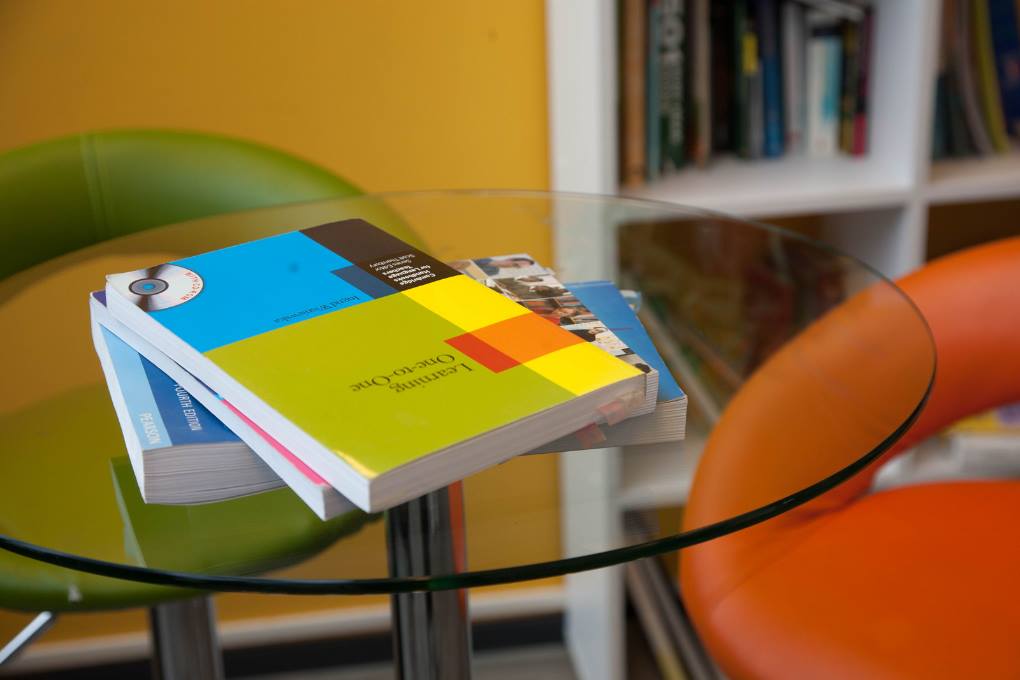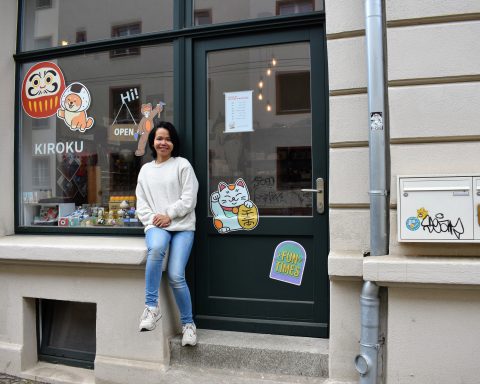[Sponsored]
So you’re a native-level English speaker, and heard or seen that Leipzig has a nice and affordable quality of life. Maybe you’ve done quite a bit of teaching abroad, and already know the ropes – good for you! Or maybe you haven’t done much of it, if any at all, and are still weighing the idea. Or you tried going down that path and it didn’t work out. Has German bureaucracy all but run you out of town? In any case, keep calm and read on: You could learn something new, uncover resources you didn’t know were there – courtesy of an international language school with a Leipzig presence.

Andréanne Roy, Director of Studies at inlingua in Leipzig, shares advice she has picked up both as a freelance English (and French) teacher and in her administrative role at the well-established school.
1. Obtain a teaching certificate.
If you want to become a language teacher, you’re likely to have to start out as a freelancer in Leipzig, and have to compete with many others trying to do the same – both newbies and veterans. So you should try to get equipped with the right qualifications. Schools are increasingly demanding certificates from candidates. The inlingua center in Leipzig offers (aspiring) English teachers a course to obtain a TESOL certificate (Teaching English for Speakers of Other Languages). The 120-hour course lasts four weeks and, besides the certificate itself at the end, includes job-seeking assistance. You can use this certificate as an English teacher anywhere in the world.
“The course is very intensive and will help you gain all the skills you need to prepare and teach great lessons,” says Roy. “It’s also more affordable than other certificates and is the first certification program to be offered in Leipzig.”
(Bonus: Fort Hays State University, this TESOL’s accrediting institution, accepts it as three credits towards a college degree from there, also online).
The next TESOL course at inlingua Leipzig starts on 28 May 2018. Check out the inlingua course page / TESOL site for dates and more details. You can also email tesol@inlingua-leipzig.de for further info and prices.
2. Sort out all your paperwork.
There is a series of steps you have to go through to become a language teacher here:
a) Register at the City of Leipzig office (Bürgeramt): You must register your residential address if you move to Leipzig as well as within Leipzig. The city has this guide in English with all the info you need to get it done.
b) Open a German bank account: You’ll need your passport and city registration for this (step a). There’s an array of physical and online banks you can choose from.
c) Get a work visa from the Foreigners’ Authority (Ausländerbehörde): And here it starts becoming a bit more complicated for non-EU citizens. The bureau tends to insist that you have a work contract (which, if you’re still looking for work, you’re not likely to have), as well as proof that you’ve got enough money to survive until you start working. As a freelance teacher, you face further demands that can be tough to meet. You can reach out to the bureau via email (auslaender-leipzig@leipzig.de) and talk to other language teachers for insights.
d) Get a tax number (Steuernummer) from the tax office (Finanzamt): Roy advises that you “make sure your number is for a ‘Freiberufler’, as there are different types of tax declaration numbers. A tax advisor can help you fill in the right forms.”
e) Get a pension insurance number (Rentenversicherungsnummer) from the Rentenversicherung bureau: This has become EXTREMELY important. Freelance teachers who’ve failed to do this are now having to contend with thousands of euros in fines. Says Roy: “As a freelancer, you must register within three months. If you are new to Germany, mention you are an ‘Existenzgründer’ – this means paying less for the first 2-3 years. There are different payment options, and exemptions for people with low income, students and, in some cases, people who pay it in their own country.”
f) Choose the right health insurance (Krankenversicherung): It’s compulsory to have health insurance in Germany. Private tends to be cheaper and works just fine for temporary stays, but Roy recommends “statutory insurance” (e.g. TK, AOK) if you plan to settle down here: “Depending on your situation, it can be difficult to change from private to statutory insurance” later.
3. Wise up on your taxes.
If you make more than €17,500, the amount of taxes you pay will be higher. Find a tax advisor and ask her or him details about this, and ways you could reduce the amount you pay. Roy recommends looking up the Lohnsteuerhilfeverein (non-profit tax help association) in Leipzig.
She advises inlingua teachers to “keep all receipts – office materials (paper, pens, erasers), lamps, desk, bus/tram tickets (also note the distances you travel to and from school), books, anything computer-related, dictionaries, language games, receipts from restaurants when you attend training. Your taxes will be lower this way.” Another very important tip: “Most schools are ‘Umsatzsteuerbefreit’ (VAT-exempt) and provide the trainers with a document proving it for the Finanzamt when they start working for them. Trainers can ask about it when starting at a new school and send it to the Finanzamt, so they don’t have to pay ‘Umsatzsteuer,'” which can be high.
4. Do research on your craft.
Exchange ideas and tips with fellow language trainers. Read books. Visit websites and social network groups. Teaching should constantly keep you on your toes. “The more you learn, the more you get hours,” Roy observes – both in terms of improving the quality of your teaching and increasing your options. There are different types of English you can teach (e.g. business, technical), so learning their specifics widens your potential client base.

Here are some materials Roy recommends for teacher development:
- The Practice of English Language Teaching, Jeremy Harmer (Pearson)
- Learning Teaching, Jim Scrivener (MacMillan)
- Games for Language Learning, Wright, Betteridge, Buckby (Cambridge)
- Delta’s and Cambridge’s books for teacher development
5. Register with all the publishers.
ESL (English as a second language) book publishers tend to offer teachers who sign up with them free webinars, in-person seminars, workshops (e.g. telc), newsletters with teaching tips, and discounted or even free books and dictionaries.
Roy recommends the following publishers:
Work as a teacher at inlingua

Founded in Bern 50 years ago and in Leipzig for the past decade, inlingua has more than 300 centers in 35 countries, and oodles of experience in the field attached to such history and presence. The local center on Prager Straße teaches English and German as its core languages, as well as various other languages based on learners’ demand and teachers’ expertise. They look for people with some teaching background or experience, to start on a freelance basis, with the possibility of being hired more permanently after a while. Check out their job offers in Leipzig.
Cover shot: Andréanne Roy, former freelance teacher, now Director of Studies at inlingua. (Photo: maeshelle west-davies)










